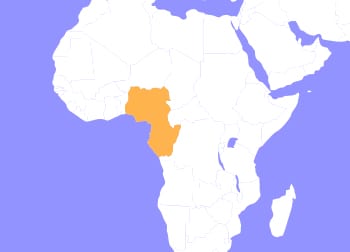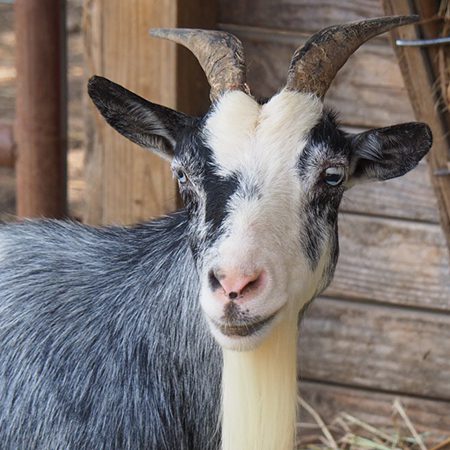African Pygmy Goat
Capra aegagrus hircus
African pygmy goats didn’t make it to the United States until the late 50s, which were exported from Europe. Pygmy goats are a native goat breed of West Africa, where they originated in the Cameroon Valley. Since they’ve come to the United States, they’ve been used in lab research, zoos, and are a common breed of goat kept as a pet. Regarding breeding, the United States has established seven breed standard approved colors; these can be categorized into dark caramel, red caramel, white caramel, light-grey agouti, dark-grey agouti, and medium-grey agouti, and solid black. They’ve gained so much popularity due to their friendly and docile nature, small size, and milk production.
Like all other goat breeds, male goats are called bucks and females are called does. Average height of an adult African pygmy goat is around 1 - 2 feet. Male goats on average can weigh between 60 to 90 lbs and females can weigh around 50 to 75 lbs. Typically, African pygmy goats produce 1 to 4 offspring every 9 to 12 months. The gestation period lasts for about 140 days. Female pygmy goats gain maturity to produce offspring within 12 to 18 weeks of age, with their offspring nursing almost immediately.
African Pygmy goats are adaptable to most climates, and enjoy having items to jump and leap on. In domesticated care, the primary diet consists of greens and grains, and require fresh water at all times. African pygmy goats are social animals that do well with a companion. They are also considered prey animals, and need appropriate shelter from predators, especially at night.

African Pygmy Goats originated in West Africa, specifically the Cameroon Valley. In the 50's they were transported to the United States.
HABITAT -In captivity, they live in a barnyard environment. In the wild, semi-arid climates of Africa.
DIET -They eat mostly greens, grains, shrubs, plants, hay, and need fresh water.
FUN FACT -African pygmy bucks have scent glands on their body that produce a strong odor to attract a mate.
SOCIAL BEHAVIOR -Very social, docile nature and friendly to humans.
ACTIVITY -African pygmy goats are diurnal, meaning they are active during the day and sleep at night.
PREDATORS -Common predators are Canine species, coyotes, wolves, foxes. As well, large cats, like mountain lions.
SIZE -They are 16 to 23 inches tall. With adults weighing between 53 to 85 lbs.
RELATIVES -Capra aegagrus hircus is a domesticated subspecies of C. aegagrus with over 300 distinct breeds of goat.
CONSERVATION -The IUCN does not consider the African pygmy goat to be threatened.
Cub Creek Animal Care Information
Housing - Our African Pygmy Goats thrive in open pasture environments, with lush green fields for grazing. The pastures are enclosed with fencing to keep predators out, and provide a covered area to take shelter in extreme weather. We provide automatic water dispensers that always keep fresh water for the goats.
Diet - The majority of our goats diets consists of grains and hay. This provides well balanced nutrition, supplemented by lush grasses they graze on. The food is provided to them in hanging food bucket containers, a feed trough, and hay feeders. Sometimes they enjoy special treats of various vegetables!
Enrichment - Goats love to play King of the Playground! We have a goat playground that was built for these guys by a local boy scout. Their ancestors were mountain climbers, so it makes sense that domesticated goats love to climb anything they can! This custom playground platform has two ramps that connect on a middle platform. This certainly helps to keep them entertained and stimulated. In the summertime, campers have been known to make special popsicle or enrichment treats, that our goats love. They love the personal one-on-one time and socialization they get with campers.


